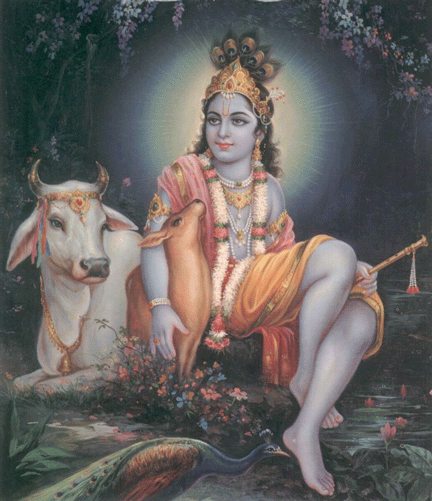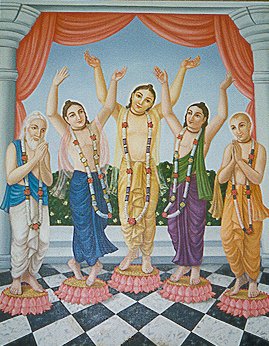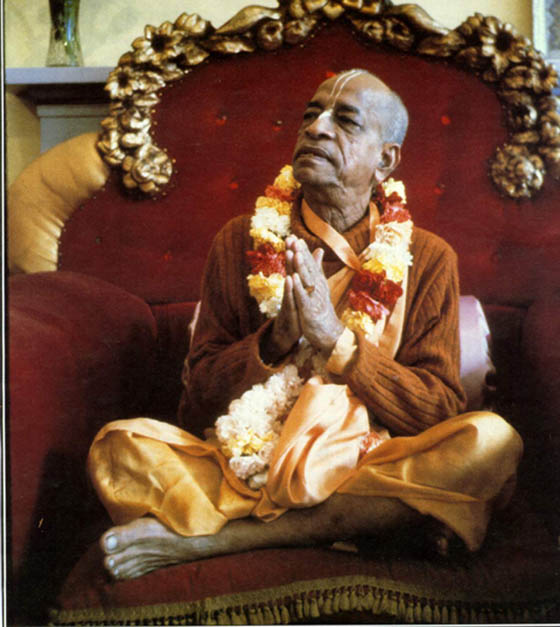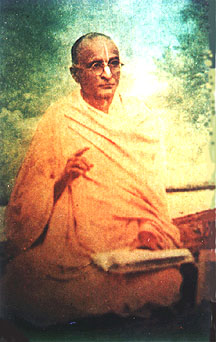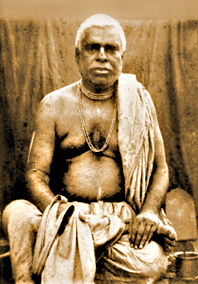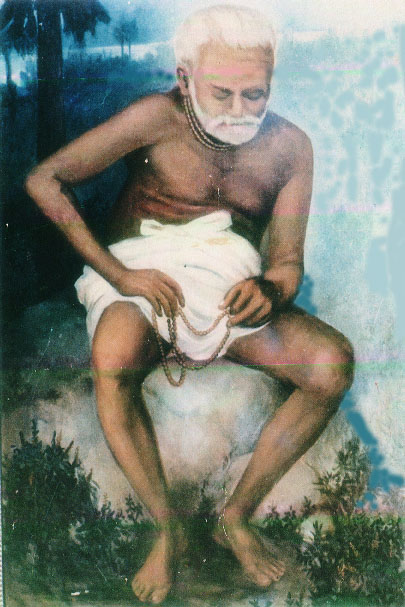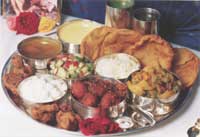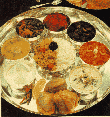
A Simple Method How To Offer Your Food With Love and Devotion To God.
last updated 23rd September 2005

We are not so naive as to suggest that God needs our food, but we are suggesting that we need God to bless the energy of our hands and thus to sustain us by means of daily bread. He does this by accepting and eating the food which we prepare and offer to Him, and then giving it back to us in the form of prasädam. In the Bhagavad-gétä Kåñëa says: “If one offers Me with love and devotion a leaf, a flower, fruit or water, I will accept it. O son of Kunté, all that you do, all that you eat, all that you offer and give away, as well as all austerities that you may perform, should be done as an offering unto Me.” (Bg. 9.26-27) Of course, He doesn’t need food; He is supreme, absolute. He is full of all opulences, namely, wealth, fame, beauty, strength, knowledge and renunciation. He is never in need or want of anything. Still, He asks His devotee to offer Him these simple fruits of the earth. The key word is devotion. Twice it is used: “If in full devotion a pure devotee offers a little leaf, a little flower, a little fruit with a little water, because he offers it with great devotion, the Supreme Personality of Godhead accepts them and eats them.” So it is not as if the Lord were in need of something; He is fully satisfied in Himself. Indeed, He is everything. So whatever we are offering Him, be it a grain or a fruit, is already His; it is not, and never was, “ours.” But out of His causeless mercy, He is so kind to His devotees that any small offering given in devotion He accepts and eats. The Lord is not hungry for our food but for our hearts; He is not wanting for our substance but for our consciousness, our love, our union.
This is why prasädam is “mercy.”
In shopping, in preparation, in eating, we are given a chance to remain
conscious of Him, to be engaged in His transcendental loving service. This
is why the word bhakti, or devotion, is so stressed—it is this bhakti which
makes the Supreme Lord “transcendentally hungry.” Even the greatest banquet
cooked by the most renowned chef has no appeal to one who is not hungry;
so, too, Kåñëa’s acceptance of our gifts is dependent
upon His being “hungry,” and only our love and devotion can do that. His
Divine Grace A. C. Bhaktivedanta Swami Prabhupäda writes: “The devotee
is so humble and submissive to the Supreme Lord that whenever he prepares
something for the Lord, he takes all care to finish the preparation nicely.
And for such offering a devotee asks nothing. It is the exchange of love.
That love is accepted by the Supreme Lord, and He eats… Therefore, devotional
service is the only way to offer anything to the Supreme Lord, to understand
the Supreme Lord, to be in the confidence of the Supreme Lord, and to go
back to the supreme abode of the Supreme Lord.” Devotional service begins
with the chanting of the Lord’s holy names, as in the mahä-mantra:
Hare Kåñëa, Hare Kåñëa, Kåñëa
Kåñëa, Hare Hare/ Hare Räma, Hare Räma, Räma
Räma, Hare Hare. That is the first great activity of transcendental
service, and the next is to prepare and offer food to the Lord. There are
a number of reasons for doing so. First of all, Kåñëa
commands it: “The devotees of the Lord are released from all sins because
they eat food which is offered first for sacrifice. Others, who prepare
food for personal sense enjoyment, verily eat only sin. All living bodies
subsist on food grains, which are produced from rains. Rains come from
performance of yajïa [sacrifice], and sacrifice is born of man’s work.”
(Bg. 3.13-14) Here, then, the Lord asserts that everything belongs to and
comes from Him alone. It is already His, but He invites us to take it and
offer it to Him first and then eat the remnants for our bodily demands.
Similarly, because everything belongs
to Him, we have no right to take anything we please, but only what He allots
us; and our allotment, according to the Gétä and the Vedas,
is what can be offered to Him: a leaf, a fruit, etc. At no point does He
ask us to offer meat, or fish, or eggs; but, on the contrary, the prohibition
against animal slaughter is so strong that even if one has only an indirect
dealing with animal slaughter, such as selling or transporting meat, he
is guilty of murder and must pay a murderer’s price. (Çrémad-Bhägavatam,
1.7.37) Therefore, we cannot offer Lord Kåñëa animal
flesh, and to do so is an offense.
![]()
If I am preparing a dinner for my friend and I know he does not like spinach, I do not fix spinach. I go to all pains to prepare only those things which he likes. That is the meaning of friendship. If one has no regard for Kåñëa’s wishes, how can he claim to be the Lord’s friend? If we want to cook nicely for Kåñëa, we must dovetail our desires with His desires; and that is clearly expressed in the above-quoted verses.
There is another reason why we must offer our food to Kåñëa if we wish to make spiritual progress. Not only are we thieves if we do not, but we become further implicated in the wheel of saàsära by sinful reactions. That every action has a reaction is as true in regard to our personal behavior as in the laboratory test tube. The slaying of life automatically provokes a like result upon the slayer, and if I sustain myself on another’s life, at some point my life will be demanded in return. That is nature’s law.
This applies equally to those who take animal life and to those who take plant life. Life is life, and the slayer will be slain. Then what is the difference? The difference is that Kåñëa says that we may offer the leaves and flowers to Him, and by accepting them He also accepts all the sinful reactions, leaving the purified remnants, free from all reactions, for our consumption. But those who eat that which is not offered to Kåñëa, or that which Kåñëa will not accept, are left with all the reactions on their own heads. That is why the Lord says: “The devotees of the Lord are released from all sins because they eat food which is offered first for sacrifice. Others, who prepare food for personal sense enjoyment, verily eat only sin.”
Of course, the devotee’s primary concern is not for himself, nor even for liberation, but always for Kåñëa. Therefore suitable foodstuffs—suitable, that is, for Kåñëa—are the concern of the pure devotee: vegetables should be fresh and appealing to the eye, grains should be wholesome, fruits large and sweet, and milk fresh and pure. Obviously, living under the conditions of the modern metropolis, these are often impossible to procure—at least on our budgets; but we must do the best we can. That is Kåñëa consciousness.
No canned foods—please!
Having selected the items for preparation, our next concern is cleanliness. Since it is the Supreme for whom we are engaging our energy, we want to be super-hygienic—not for ourselves, but for Him. Wash your hands thoroughly as soon as you come into the kitchen; wash the food as you prepare it; use nothing that touches the floor or other contaminated areas, such as the sink and garbage pail, unless it can be cleansed. In all preparations, use only fresh things; no leftovers should be mixed in (they should not even be in the kitchen, but rather kept in a specific area of the dining room). Remember, we are cooking for the Supreme, and that which has been offered once should not be offered a second time. And, as good Vaiñëavas (devotees), we refrain from using garlic, onion, mushroom, and from mixing salt with fresh milk (although there is no restriction with any other kind of milk culture).
Finally, and probably hardest for American cooks, don’t taste the food during preparation—not even to see if it is seasoned properly. I know that it is difficult, but it is worthwhile; we are cooking for Kåñëa, and He must be the first to relish it.
When the food is nicely prepared we offer it back to the Source from which everything emanates. If we remember that His “hunger” is proportional to our love, the offering is sure to be successful.
Simply place love, and a generous portion of each item to be offered, on a plate or metal tray, along with a glass of fresh water, and set it before the Deity or picture of Kåñëa. Then prostrate yourself and pray to Lord Kåñëa to accept your humble offering. Acknowledging that it is through the mercy of the spiritual master and the golden incarnation Lord Caitanya that Kåñëa accepts our offering, the devotees of the Kåñëa consciousness movement offer food to the Lord with these prayers:
Listen
to prayers HERE
1) nama oà viñëu-pädäya
kåñëa-preñöhäya bhü-tale
![]() çrémate
bhaktivedänta-svämin iti nämine
çrémate
bhaktivedänta-svämin iti nämine
![]() namas
te särasvate deve gaura-väëé-pracäriëe
namas
te särasvate deve gaura-väëé-pracäriëe
![]() nirviçeña-çünyavädi-päçcätya-deça-täriëe
nirviçeña-çünyavädi-päçcätya-deça-täriëe
“I offer my respectful obeisances unto His Divine Grace A. C. Bhaktivedanta Swami Prabhupäda, who is very dear to Lord Kåñëa, having taken shelter at His lotus feet.
“Our respectful obeisances unto you, O spiritual master, servant of Sarasvaté Gosvämé. You are kindly preaching the message of Lord Caitanyadeva and delivering the Western countries, which are filled with impersonalism and voidism.”
Listen
to prayers HERE
2) namo mahä-vadänyäya
kåñëa-prema-pradäya te
![]() kåñëäya
kåñëa-caitanya-nämne gaura-tviñe namaù
kåñëäya
kåñëa-caitanya-nämne gaura-tviñe namaù
“I offer my respectful obeisances unto the Supreme Lord Çré Kåñëa Caitanya, who is more magnanimous than any other incarnation, even Kåñëa Himself, because He is bestowing freely what no one else has ever given—pure love of Kåñëa.”
Listen
to prayers HERE
3) namo brahmaëya-deväya
go-brähmaëa-hitäya ca
![]() jagad-dhitäya
kåñëäya govindäya namo namaù
jagad-dhitäya
kåñëäya govindäya namo namaù
"I offer my respectful obeisances to the Supreme Absolute Truth, Kåñëa, who is the well-wisher of the cows and the brähmaëas as well as the living entities in general. I offer my repeated obeisances to Govinda, who is the pleasure reservoir for all the senses. “
After offering the food to the Lord, you may distribute the prasädam to all who are present. Çréla Bhaktivinoda Öhäkura, a great spiritual master in the disciplic succession, has written a nice prayer which you may recite before eating:
“O Lord, this material body is a place of ignorance, and the senses are a network of paths leading to death. Somehow, we have fallen into this ocean of material sense enjoyment, and of all the senses the tongue is most voracious and uncontrollable; it is very difficult to conquer the tongue in this world. But You, dear Kåñëa, are very kind to us and have given us such nice prasädam just to control the tongue. So now we take that prasädam to our full satisfaction and glorify You, Lord—Rädhä and Kåñëa—and in love call for the help of Lord Caitanya and Nityänanda.çaréra abidyä-jäl, joòendriya tähe käl,
jéve phele viñaya-sägore
tä’ra madhye jihwä ati, lobhamoy sudurmati,
tä’ke jetä kaöhina saàsäre
kåñëa baro doyämoy, koribäre jihwä jay,
swa-prasäd-anna dilo bhäi
sei annämåta päo, rädhä-kåñëa-guëa gäo,
preme òäko caitanya-nitäi
From the 1973 Hare Krishna Cookbook.
(note: if you cannot for one reason or another recite the Sanskrit or Bengali mantras that's okay. Better in that case try to, but if you feel that you'd prefer to recite the English translations with devotion that would also be effective - the Lord is interested in the love and devotion that you show, not the linguistics - but still one can practice the Sanskrit. Here's the Bengali to the Prasada sevaya prayers above)
![]()

